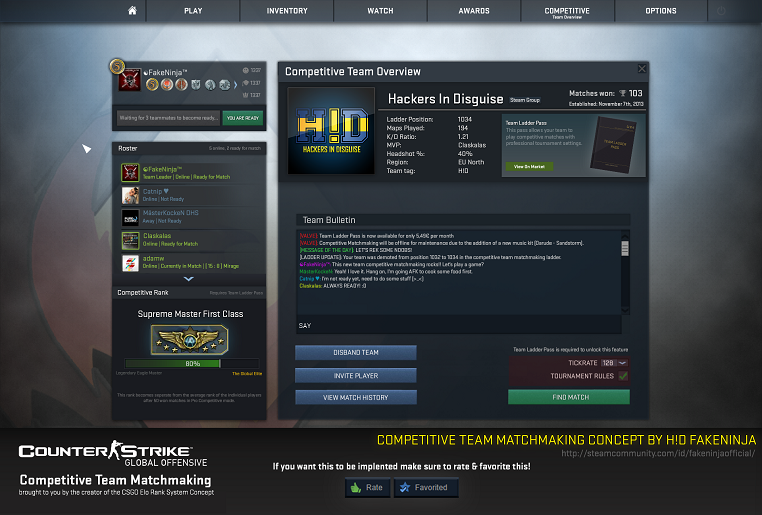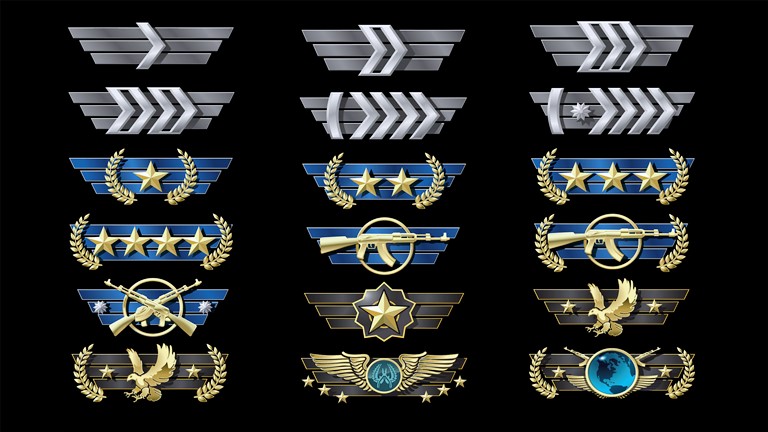
CS:GO matchmaking is a system used in the popular first-person shooter game Counter-Strike: Global Offensive (CS:GO) that allows players to compete against others of similar skill levels in competitive matches.
The matchmaking system pairs players with opponents based on their rank and skill level, which is determined by their performance in previous matches. Players earn or lose points based on the outcome of the match, and their rank is adjusted accordingly.
CS:GO matchmaking is a popular way for players to compete against others in a structured environment, and it provides a fair and balanced way to match players of similar skill levels against each other. It’s a great way for players to improve their skills and compete in a competitive environment.
What ranks are in CSGO

In CS:GO, there are 18 different ranks that players can achieve through competitive matchmaking. These ranks are divided into six tiers, with three ranks in each tier.
The ranks, from lowest to highest, are as follows:
- Silver I
- Silver II
- Silver III
- Silver IV
- Silver Elite
- Silver Elite Master
- Gold Nova I
- Gold Nova II
- Gold Nova III
- Gold Nova Master
- Master Guardian I
- Master Guardian II
- Master Guardian Elite
- Distinguished Master Guardian
- Legendary Eagle
- Legendary Eagle Master
- Supreme Master First Class
- Global Elite
As players win matches and improve their performance, they will receive more points and progress through the ranks. The higher the rank, the more skilled and experienced the player is considered to be.
How to get another rank
In CS:GO, the ranking system is based on a player’s performance in competitive matchmaking. To achieve a higher rank, players must win matches and perform well in those matches.
Here are some tips on how to improve your chances of getting a higher rank:
- Play consistently: Try to play regularly and consistently to improve your skills and become a more experienced player.
- Practice: Practice your aim, movement, and game sense in offline modes, deathmatch, or community servers to hone your skills.
- Communicate: Communication is key in CS:GO. Make sure to communicate with your team and call out important information.
- Work as a team: CS:GO is a team game, and working together with your team can greatly improve your chances of winning matches.
- Analyze your gameplay: Review your own gameplay and analyze your mistakes to identify areas where you can improve.
- Play with friends: Playing with friends who are of a similar skill level can be a great way to improve and progress through the ranks together.
- Stay positive: Keeping a positive attitude can help you stay focused and motivated, even in tough matches.
Remember, the ranking system is based on your performance over time, so it may take several matches to achieve a higher rank. Keep working hard, and eventually, you will see the results.
Who assigns the ranks
The ranks in CS:GO are assigned by the game’s matchmaking system, which uses a sophisticated algorithm to evaluate a player’s performance in competitive matches. The matchmaking system takes into account a variety of factors, including a player’s win-loss record, individual performance, and the skill level of their opponents.
Each player has a hidden matchmaking rating (MMR) that is used to determine their rank. As a player wins matches and performs well, their MMR increases, which can lead to a higher rank. Conversely, if a player loses matches or performs poorly, their MMR will decrease, potentially leading to a lower rank.
It’s worth noting that the matchmaking system is not perfect, and players may occasionally find themselves matched against opponents who are significantly higher or lower in skill level than they are. However, over time, the matchmaking system should generally provide players with fair and balanced matches against opponents of similar skill levels.


